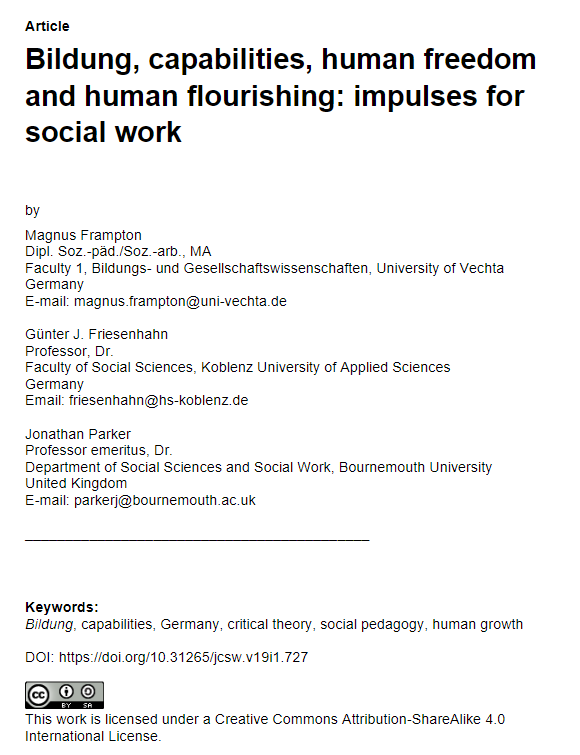
- Frampton, M., Friesenhahn, G. J., & Parker, J. (2024). Bildung, capabilities, human freedom and human flourishing: impulses for social work. Journal of Comparative Social Work, 19(1), 129–156. https://doi.org/10.31265/jcsw.v19i1.727
Latest research and knowledge exchange news at Bournemouth University

Bournemouth University’s collaboration in the field of ageing research in Qatar is going from strength to strength. BU staff have been working with academics and clinicians at Hamad Medical Corporation’s (HMC) Department of Geriatrics and Long-Term Care. HMC has been appointed as a WHO (World Health Organization) Collaborating Centre for Healthy Ageing and Dementia, under auspices of Ministry of Publich Health in Qatar. Hamad Medical Corporation is not-for profit organisation. Tomorrow morning (7.00 AM UK time) FHSS will be contributing to an International Survey Research Workshop, together with BU’s Faculty of Health & Social Sciences Visiting Faculty Dr. Brijesh Sathian (based at HMC), and Prof. Padam Simhada, based at the University of Huddersfield.
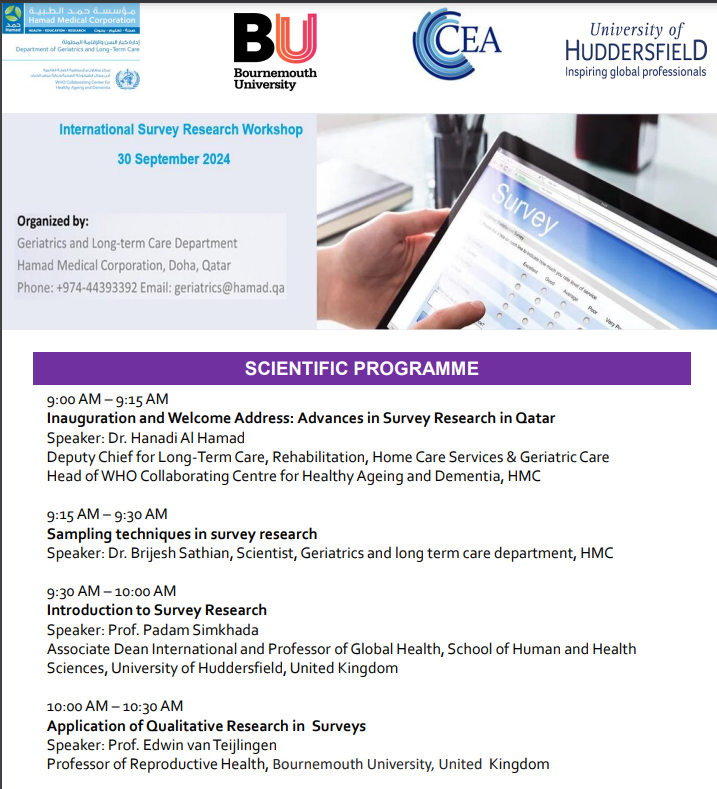
Our latest CMWH newsletter (autumn 2024 edition) is out now. Click here! 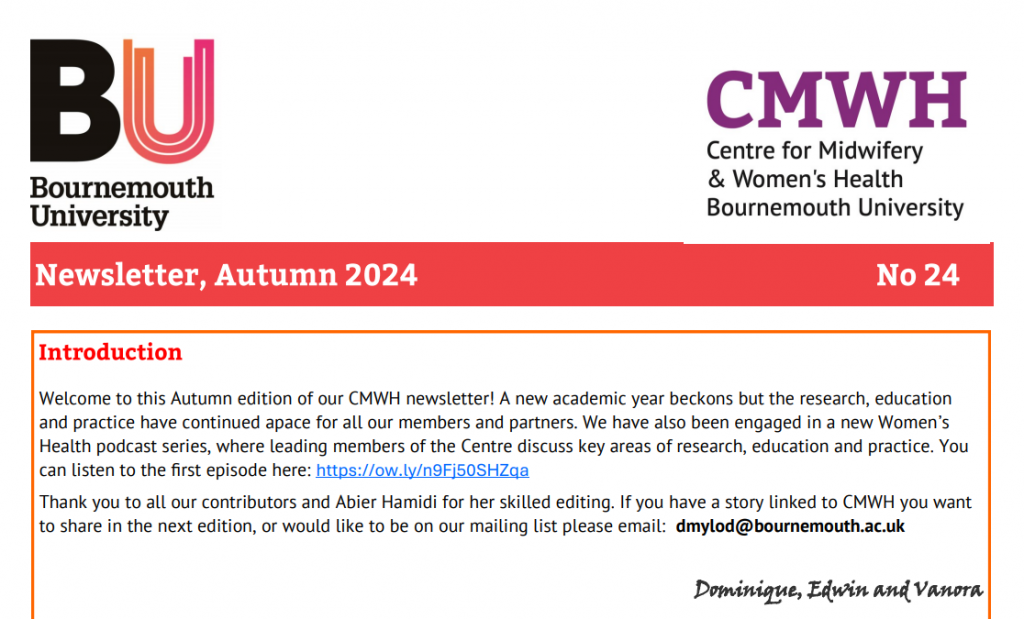 This edition includes news items and stories related the successes of CMWH staff and students. For example, about Drs. Dominique Mylod and Daisy Wiggins who both secured innovative NIHR funding for undergraduate student internships. Or about the recently awarded National Institute for Health and Care Research (NIHR) funding for ‘INSIGHT: Inspiring Students into Research’. This innovative three-year programme started this summer as part of the NIHR Academy’s portfolio of career support for health and social care professionals. The programme supports the NIHR aim to develop a highly skilled research workforce capable of advancing the best research which improves health and care, and benefits society and the economy.
This edition includes news items and stories related the successes of CMWH staff and students. For example, about Drs. Dominique Mylod and Daisy Wiggins who both secured innovative NIHR funding for undergraduate student internships. Or about the recently awarded National Institute for Health and Care Research (NIHR) funding for ‘INSIGHT: Inspiring Students into Research’. This innovative three-year programme started this summer as part of the NIHR Academy’s portfolio of career support for health and social care professionals. The programme supports the NIHR aim to develop a highly skilled research workforce capable of advancing the best research which improves health and care, and benefits society and the economy.
There is also an item on the importance of humour to stimulate interest and engagement with taboo women’s health topics. CMWH’s Rosie Harper, a PhD researcher and pelvic floor physiotherapist at University Hospitals Dorset NHS Foundation Trust has led a study with comedian and women’s health physiotherapist Elaine Miller and the results were published in Health Expectations. Elaine’s Instagram campaign ran daily for 3 months @gusset_grippers. And there are many more stories and announcements. The editors would like to thank Abier Hamidi for her excellent editorial support!
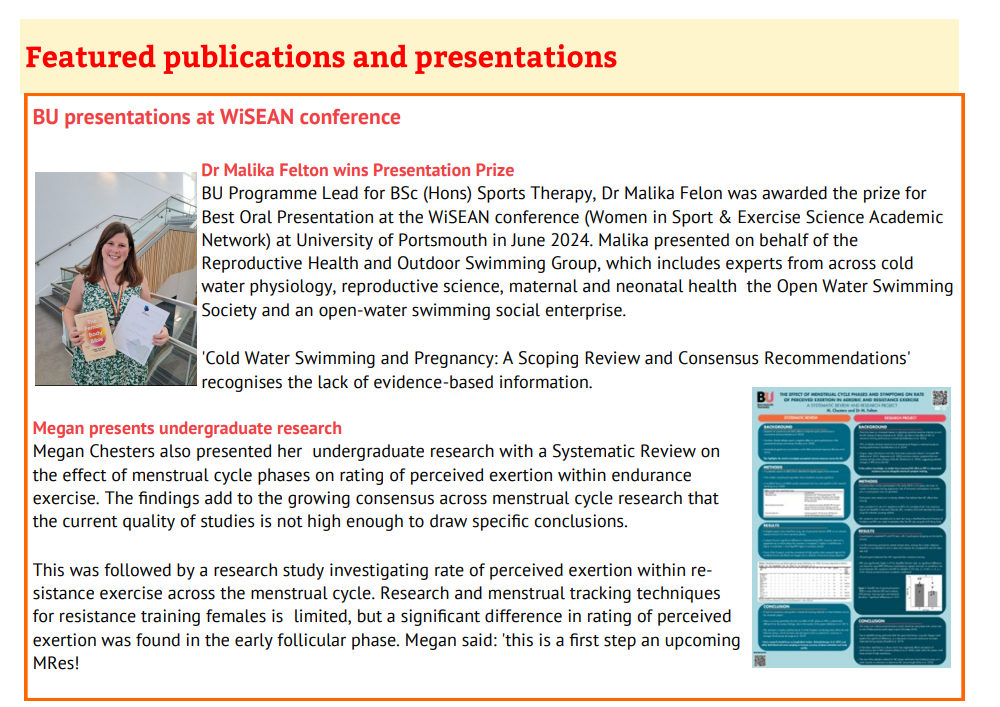
Last Sunday ResearchGate informed us that the paper ‘Health facility preparedness of maternal and neonatal health services: a survey in Jumla, Nepal‘ [1] published in the international journal BMC Health Services Research had been read 10,000 times. In this paper, which is in an Open Access journal, Pasang reports on a cross-sectional study conducted in 2019 covering all 31 state health facilities in a district of Nepal to assess the availability of maternal and neonatal health services including appropriate workforce and access to essential medicines. 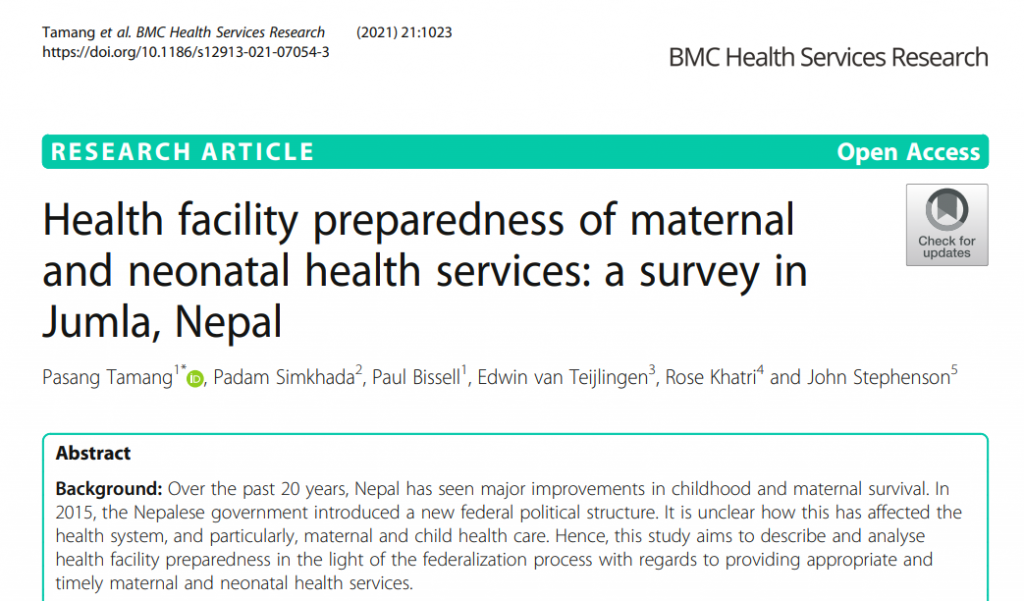 Tests of association between demographic factors and the probability of a facility experiencing a shortage of essential medicine within the last 3 months were also conducted as exploratory procedures. Overall health facilities reported better availability of staff than of drugs. The authors concluded that health facilities in Nepals should be supported to meet required minimal standards such as availability of essential medicines and the provision of emergency ambulance transport for women and newborns. This paper was part of Dr. Pasang Tamang’s Ph.D. project at the University of Huddersfield, which resulted in four other related publications [2-5]. Pasang is currently working as a Lecturer in Public Health in the School of Human Sciences at the University of Greenwich.
Tests of association between demographic factors and the probability of a facility experiencing a shortage of essential medicine within the last 3 months were also conducted as exploratory procedures. Overall health facilities reported better availability of staff than of drugs. The authors concluded that health facilities in Nepals should be supported to meet required minimal standards such as availability of essential medicines and the provision of emergency ambulance transport for women and newborns. This paper was part of Dr. Pasang Tamang’s Ph.D. project at the University of Huddersfield, which resulted in four other related publications [2-5]. Pasang is currently working as a Lecturer in Public Health in the School of Human Sciences at the University of Greenwich.

Prof. Edwin van Teijlingen

References:
Dr. Rebecca Neal in the Centre for Midwifery & Women’s Health (CMWH) who has a poster accepted for presentation at the prestigious GLOW conference later this month. This poster ‘Heat resilience and midwives: Bridging the gap for women’s health in a changing global climate. The 2024 GLOW conference, supported by the Medical Research Council, will focus on the effects of the ongoing global crises of climate change, infectious diseases, mental health, and conflict and migration on women’s and newborn health.
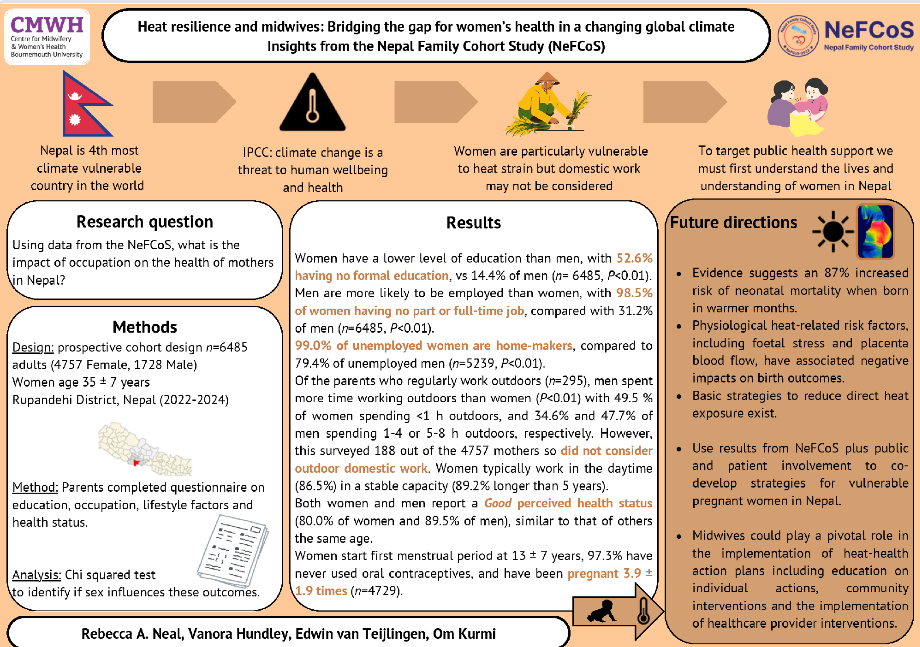 Insights from the Nepal Family Cohort Study (NeFCoS). NeFCoS is a multidisciplinary, longitudinal family cohort study designed to be one of its kind, informative research conducted in various geographical areas of Nepal. NeFCoS, led by Dr. Om Kurmi at the University of Coventry is part large-scale epidemiological study supported by BU and several other universities in the UK and elsewhere.
Insights from the Nepal Family Cohort Study (NeFCoS). NeFCoS is a multidisciplinary, longitudinal family cohort study designed to be one of its kind, informative research conducted in various geographical areas of Nepal. NeFCoS, led by Dr. Om Kurmi at the University of Coventry is part large-scale epidemiological study supported by BU and several other universities in the UK and elsewhere.

 Twenty reads may not look a lot, but this paper on kidney disease in Nepalese migrant workers was only published in the second half of last month. Our paper ‘Exploring lifestyles, work environment and health care experience of Nepalese returnee labour migrants diagnosed with kidney-related problems’ [1] resulted from a study funded by UK-based charity The Colt Foundation.
Twenty reads may not look a lot, but this paper on kidney disease in Nepalese migrant workers was only published in the second half of last month. Our paper ‘Exploring lifestyles, work environment and health care experience of Nepalese returnee labour migrants diagnosed with kidney-related problems’ [1] resulted from a study funded by UK-based charity The Colt Foundation.
One of the problems with kidney disease is that damage might be inflicted over a long period before people experience serious symptoms, as they might not show until the kidneys are working on less than half their capacity and long-term permanent damage has been done. This study indicates that Nepalese migrant workers face numerous challenges, including limited access to clean water and sanitation facilities, poor diets, exposure to occupational hazards, and overuse of pain medication, all of which may contribute to an increased risk of kidney disease.
 The paper is Open Access, and hence freely available to everybody with internet access. Our faculty of Health & Social Sciences team (Dr. Nirmal Aryal, Dr. Pramod Remi & Prof. Edwin van Teijlingen) has written many scientific papers (as well as a few Viewpoint articles) on a wide-range of aspects related to the health and well-being of migrant workers [2-33], our co-authors include former BU staff members Dr. Preeti Mahato, Dr. Bibha Simkhada, Dr. Shovita Adhikari Dhakal, Dr. Steve Trenoweth, Dr. Steve Keen, Dr. Zoe Sheppard and former BU PhD student Pratik Adhikary.
The paper is Open Access, and hence freely available to everybody with internet access. Our faculty of Health & Social Sciences team (Dr. Nirmal Aryal, Dr. Pramod Remi & Prof. Edwin van Teijlingen) has written many scientific papers (as well as a few Viewpoint articles) on a wide-range of aspects related to the health and well-being of migrant workers [2-33], our co-authors include former BU staff members Dr. Preeti Mahato, Dr. Bibha Simkhada, Dr. Shovita Adhikari Dhakal, Dr. Steve Trenoweth, Dr. Steve Keen, Dr. Zoe Sheppard and former BU PhD student Pratik Adhikary.
Dr. Pramod Regmi, Dr. Nirmal Aryal & Prof. Edwin van Teijlingen
References:
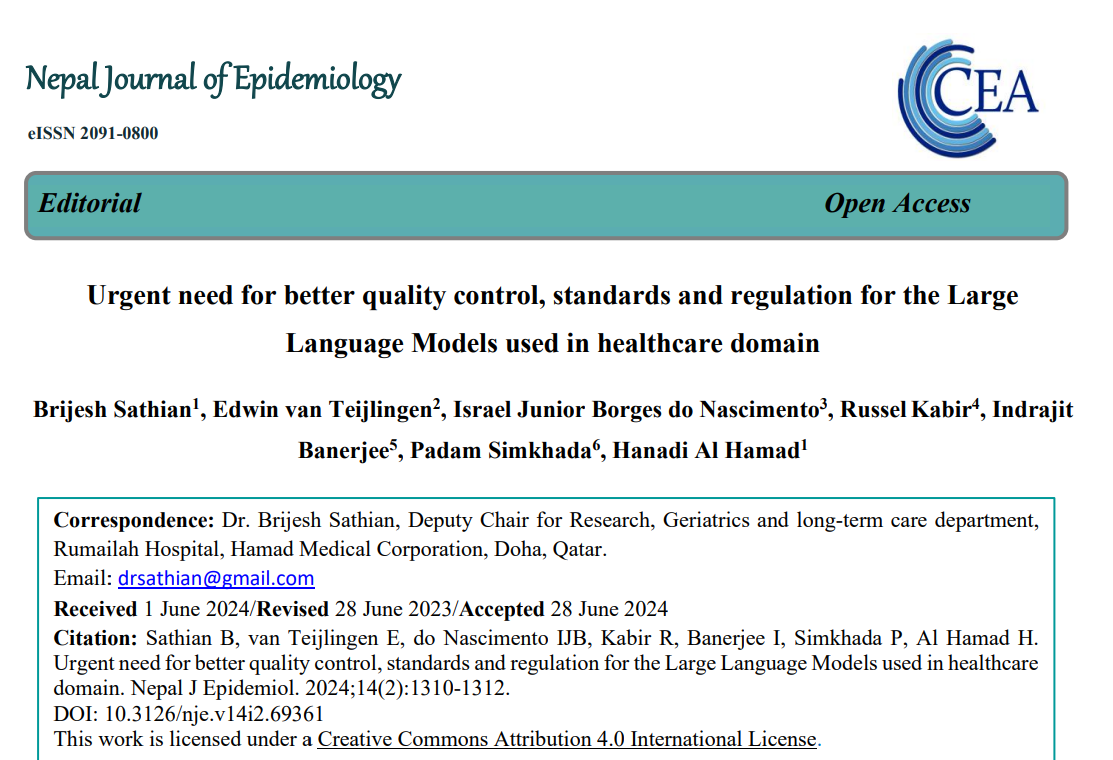 A few days ago we published the editorial for the latest issues of the Nepal Journal of Epidemiology. This editorial under the title ‘Urgent need for better quality control, standards and regulation for the Large Language Models used in healthcare domain‘ [1] comments that current methodologies for ensuring AI (Artificial Intelligence) technology’s safety and efficacy may be adequate for earlier AI iterations predating generative artificial intelligence (GAI). However, better clinical gouvernance GAI may necessitate the development of novel regulatory frameworks. As AI technology advances, researchers, academic institutions, funding bodies, and publishers should continue to examine its impact on scientific inquiry and revise their understanding, ethical guidelines, and regulations accordingly.
A few days ago we published the editorial for the latest issues of the Nepal Journal of Epidemiology. This editorial under the title ‘Urgent need for better quality control, standards and regulation for the Large Language Models used in healthcare domain‘ [1] comments that current methodologies for ensuring AI (Artificial Intelligence) technology’s safety and efficacy may be adequate for earlier AI iterations predating generative artificial intelligence (GAI). However, better clinical gouvernance GAI may necessitate the development of novel regulatory frameworks. As AI technology advances, researchers, academic institutions, funding bodies, and publishers should continue to examine its impact on scientific inquiry and revise their understanding, ethical guidelines, and regulations accordingly.
The co-authors include two Bournemouth University Visiting Faculty, Prof. Padam Simkhada (based at the University of Huddersfield) and Dr. Brijesh Sathian (based at Rumailah Hospital, Qatar).
Prof. Edwin van Teijlingen
CMWH

Reference:
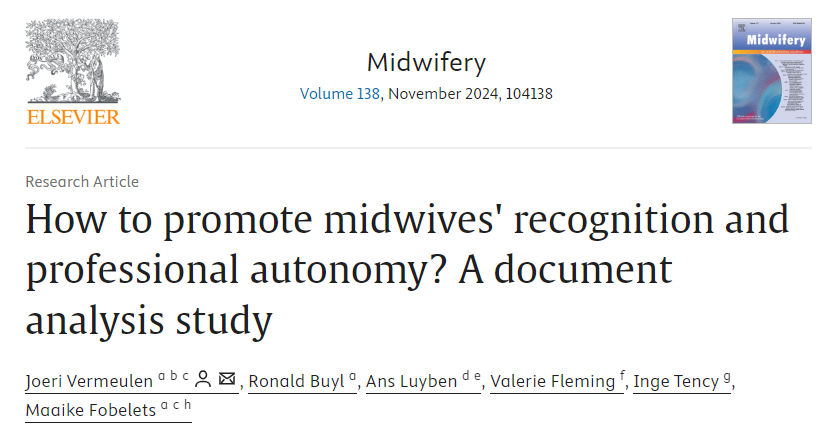 Congratulations to Dr. Ans Luyben on the publication of her latest midwifery article ‘How to promote midwives’ recognition and professional autonomy? A document analysis study’ [1]. This latest paper will appear in the forthcoming November issue of the international scientific journal Midwifery, published by Elsevier.
Congratulations to Dr. Ans Luyben on the publication of her latest midwifery article ‘How to promote midwives’ recognition and professional autonomy? A document analysis study’ [1]. This latest paper will appear in the forthcoming November issue of the international scientific journal Midwifery, published by Elsevier.
 The paper identified challenges in Belgian midwives’ recognition and professional autonomy and provided recommendations to address them, emphasizing the importance of recognized authority in midwifery. Implementing these recommendations can positively impact midwives’ recognition and autonomy in Belgium as well as in other countries. Ans has long been affiliated with the Centre of Midwifery & Women’s Health (CMWH) as Visiting Faculty and she works in the Frauenzentrum (Centre for Women’s Health), Lindenhofgruppe, Bern, Switzerland.
The paper identified challenges in Belgian midwives’ recognition and professional autonomy and provided recommendations to address them, emphasizing the importance of recognized authority in midwifery. Implementing these recommendations can positively impact midwives’ recognition and autonomy in Belgium as well as in other countries. Ans has long been affiliated with the Centre of Midwifery & Women’s Health (CMWH) as Visiting Faculty and she works in the Frauenzentrum (Centre for Women’s Health), Lindenhofgruppe, Bern, Switzerland.

Well done!
Prof. Edwin van Teijlingen
Reference:

Last week colleagues from our Sonamoni project co-hosted a workshop with TGI Australia (The George Institute for Global Health) at the 15th World Conference on Injury Prevention and Safety Promotion (Safety 2024) which was held in New Delhi (India). Focusing on the strengths of the Human-Centred Design (HCD) approach, this workshop first introduced the design principles to participants and demonstrated how they can be employed to reduce risks and prevent accidents. These design principles have been applied for many years in designing consumer products and, more recently, in the fields of health and social systems. 
In this well-attended workshop researchers presented case studies from Bangladesh (including the Sonamoni project) and Tanzania to illustrate how the process is employed with communities to co-develop interventions aimed at reducing the risk of drowning among fishing folk and vulnerable children. ![]() The team proposed a framework which integrates HCD methodology and traditional research methodologies, creating a more user-centred and multidimensional approach to intervention design. Outputs of the process included user risk journeys, stakeholder mapping and systems diagrams that can be used with communities and wider stakeholders to visualise the problem and bring to life the environment in which interventions are to be designed. These outputs can also be support advocacy and donor engagement.
The team proposed a framework which integrates HCD methodology and traditional research methodologies, creating a more user-centred and multidimensional approach to intervention design. Outputs of the process included user risk journeys, stakeholder mapping and systems diagrams that can be used with communities and wider stakeholders to visualise the problem and bring to life the environment in which interventions are to be designed. These outputs can also be support advocacy and donor engagement.
 The proposed framework provides a mechanism for closer collaboration between researchers, practitioners, and communities to work together to co-design context-specific solutions that are culturally and environmentally appropriate. Workshop participants were asked for their expert opinion on the proposed framework, to help us refine the framework and inform future practice.
The proposed framework provides a mechanism for closer collaboration between researchers, practitioners, and communities to work together to co-design context-specific solutions that are culturally and environmentally appropriate. Workshop participants were asked for their expert opinion on the proposed framework, to help us refine the framework and inform future practice.
Our Sonamoni project recently had its own video recording on YouTube.  Sonamoni is a public health project is funded by the National Institute for Health and Care Research (NIHR) through its Research and Innovation for Global Health Transformation programme. For more information, visit the NIHR website.
Sonamoni is a public health project is funded by the National Institute for Health and Care Research (NIHR) through its Research and Innovation for Global Health Transformation programme. For more information, visit the NIHR website.  Sonamoni is coordinated by Bournemouth University in collaboration with Centre for Injury Prevention and Research, Bangladesh (CIPRB), the University of the West of England, Bristol, the University of Southampton, the Royal National Lifeboat Institution (RNLI), and design Without Borders (DWB) Africa.
Sonamoni is coordinated by Bournemouth University in collaboration with Centre for Injury Prevention and Research, Bangladesh (CIPRB), the University of the West of England, Bristol, the University of Southampton, the Royal National Lifeboat Institution (RNLI), and design Without Borders (DWB) Africa.
Prof. Edwin van Teijlingen
Centre for Midwifery & Women’s Health
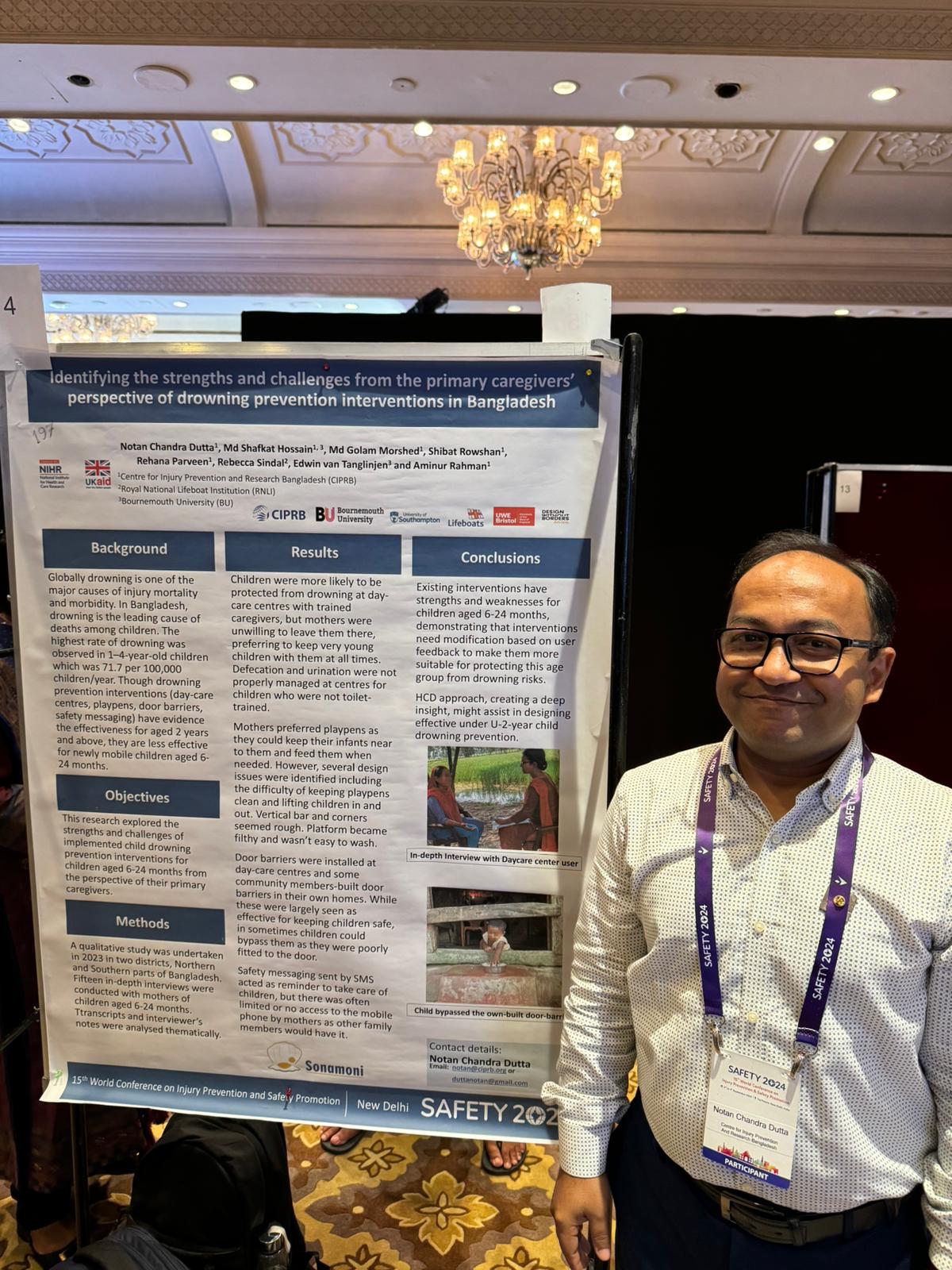 This week Notan Dutta, from our collaborating research organisation CIPRB (Centre for Injury Prevention and Research Bangladesh) presented a poster on ‘Identifying the strengths and challenges from the perspective of primary caregivers of drowning prevention interventions in Bangladesh’ at the 15th World Conference on Injury Prevention & Safety Promotion (Safety 2024). One of the co-authors of this poster presentation is Bournemouth University’s PhD student Md. Shafkat Hossain. Shafkat also attended the conference in India. Shafkat was in Delhi funded by Bloomberg Philanthropies as part of its Emerging Leaders in Drowning Prevention programme.
This week Notan Dutta, from our collaborating research organisation CIPRB (Centre for Injury Prevention and Research Bangladesh) presented a poster on ‘Identifying the strengths and challenges from the perspective of primary caregivers of drowning prevention interventions in Bangladesh’ at the 15th World Conference on Injury Prevention & Safety Promotion (Safety 2024). One of the co-authors of this poster presentation is Bournemouth University’s PhD student Md. Shafkat Hossain. Shafkat also attended the conference in India. Shafkat was in Delhi funded by Bloomberg Philanthropies as part of its Emerging Leaders in Drowning Prevention programme.  This initiative brings together a cohort of younger leaders to join national and international efforts to raise awareness and strengthen solutions and political commitment towards drowning.
This initiative brings together a cohort of younger leaders to join national and international efforts to raise awareness and strengthen solutions and political commitment towards drowning.
Our research into drowning prevention of under two-year old children in rural Bangladesh is funded by the National Institute for Health and Care Research (NIHR) through their Research and Innovation for Global Health Transformation programme.  For more information about our ongoing collaborative research in Bangladesh, please see the NIHR website. This is an interdisciplinary project between Bournemouth University, CIPRB, the RNLI (Royal National Lifeboat Institute), the University of the West of England, the University of the West of England, and Design Without Borders (DWB) in Uganda.
For more information about our ongoing collaborative research in Bangladesh, please see the NIHR website. This is an interdisciplinary project between Bournemouth University, CIPRB, the RNLI (Royal National Lifeboat Institute), the University of the West of England, the University of the West of England, and Design Without Borders (DWB) in Uganda.
Prof. Edwin van Teijlingen & Dr. Mavis Bengtsson
Centre for Midwifery & Women’s Health
 Last night ResearchGate informed us that our paper ‘Understanding health education, health promotion and public health‘ had reached 6,000 reads [1]. This reflective paper in an Open Access journal tries to bring a little more clarity in the confusion around the difference between the concepts of health education, health promotion and public health. We argue that such confusion does not limit itself to the individual terms but also to how these terms relate to each other. Some authors and public health practitioners use terms such as health education and health promotion interchangeably; others see them clearly as different concepts.
Last night ResearchGate informed us that our paper ‘Understanding health education, health promotion and public health‘ had reached 6,000 reads [1]. This reflective paper in an Open Access journal tries to bring a little more clarity in the confusion around the difference between the concepts of health education, health promotion and public health. We argue that such confusion does not limit itself to the individual terms but also to how these terms relate to each other. Some authors and public health practitioners use terms such as health education and health promotion interchangeably; others see them clearly as different concepts. 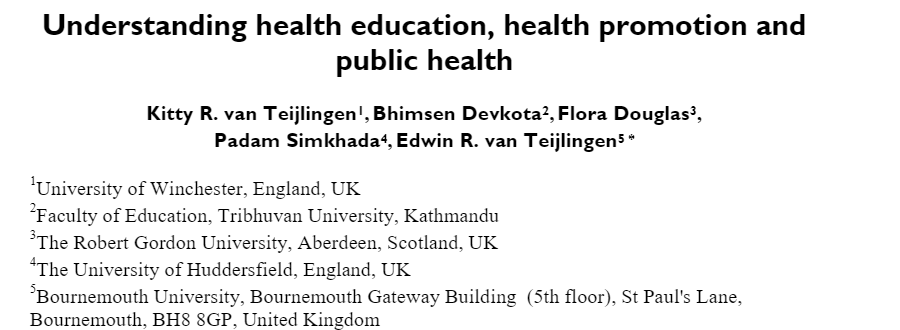
In this theoretical overview paper, we have first of all outlined our understanding of these individual terms. We suggest how the five principles of health promotion as outlined by the World Health Organization (WHO) fit into Andrew Tannahill’s model from 2009 [2] of three overlapping areas: (a) health education; (b) prevention of ill health; and (c) health protection. Our schematic overview places health education within health promotion and health promotion itself in the center of the overarching disciplines of education and public health. We hope our representation helps reduce confusion among all those interested in our discipline, including students, educators, journalists, practitioners, policymakers, politicians, and researchers.
The paper is co-authored by a primary school teacher based in Dorset, and four professors who have a combined experience in the wider public health field of over a century.
Prof. Edwin van Teijlingen
Centre for Midwifery & Women’s Health

References:
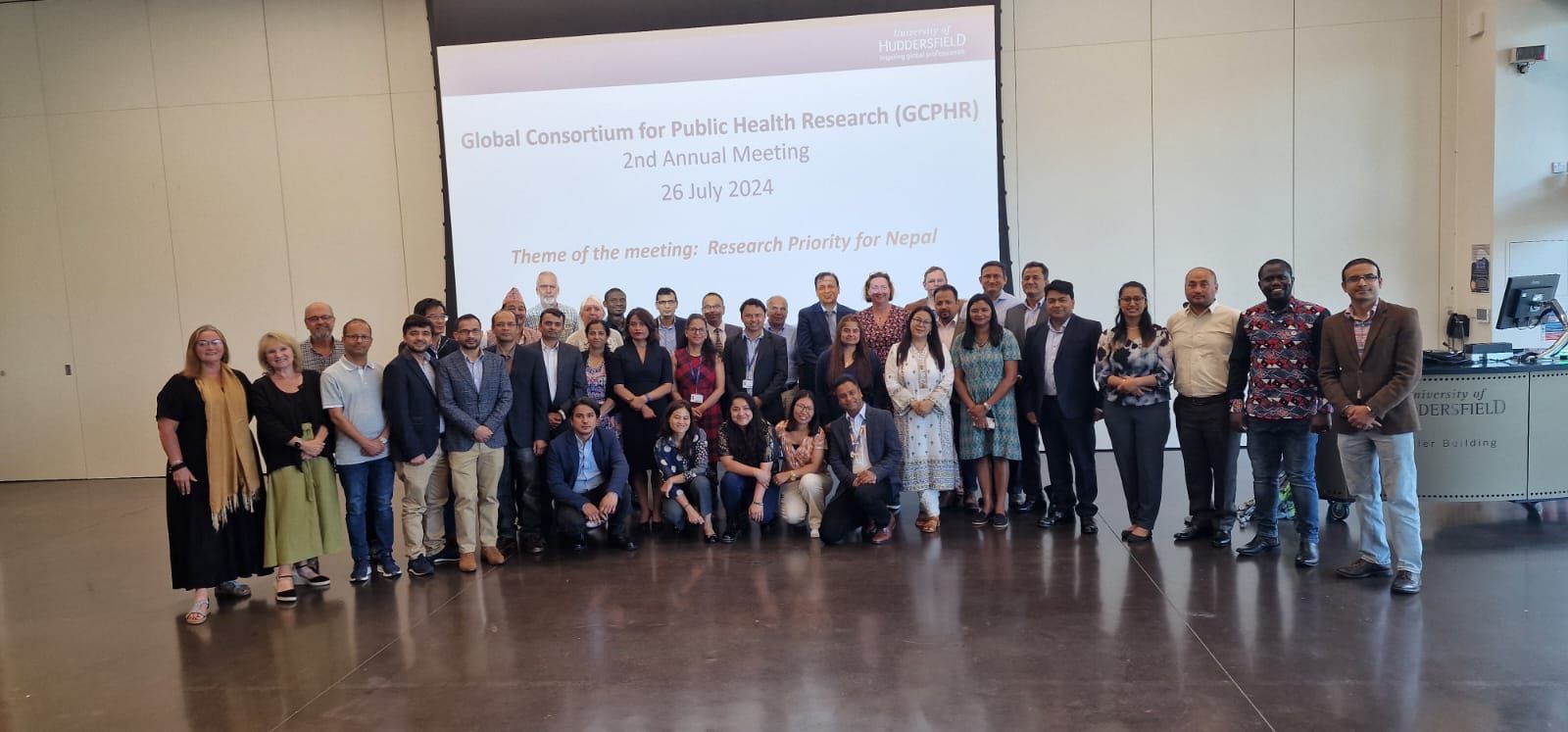 The University of Huddersfield recently hosted the 2nd annual meeting for the Global Consortium for Public Health Research (GCPHR), with the theme ‘Research Priority in Nepal’. A lovely write-up of the even just appeared online (click here to read this). Among its invited international delegates were Dr. Pramod Regmi (Centre for Wellbeing & Long-Term Health) and Prof. Edwin van Teijlingen (Centre for Midwifery & Women’s Health). GCPHR is led by Prof Padam Simkhada, Professor of Global Health and Associate Dean (International) of the School of Human & Health Sciences at the University of Huddersfield as well as Visiting Professor in the Faculty of Health & Social Sciences at Bournemouth University. This interdisciplinary event was funded by funded by the University of Huddersfield’s PVC International’s International collaborative fund (ICF).
The University of Huddersfield recently hosted the 2nd annual meeting for the Global Consortium for Public Health Research (GCPHR), with the theme ‘Research Priority in Nepal’. A lovely write-up of the even just appeared online (click here to read this). Among its invited international delegates were Dr. Pramod Regmi (Centre for Wellbeing & Long-Term Health) and Prof. Edwin van Teijlingen (Centre for Midwifery & Women’s Health). GCPHR is led by Prof Padam Simkhada, Professor of Global Health and Associate Dean (International) of the School of Human & Health Sciences at the University of Huddersfield as well as Visiting Professor in the Faculty of Health & Social Sciences at Bournemouth University. This interdisciplinary event was funded by funded by the University of Huddersfield’s PVC International’s International collaborative fund (ICF).
After the event BU’s Dr. Pramod Regmi reminded us that: “It is important to meet up in person, especially for larger international and interdisciplinary research projects. There is only so much you can do online in meeting.” There is a great advantage of online meetings by Zoom, Teams or Google Meet, especially when working with countries like Nepal. Not least of course in reducing our global carbon footprint. Of course, such meeting help academics to build and maintain research contacts across the globe, but it is not the same as sitting in the same room with someone and share ideas over coffee.

Mapping projects related to mass atrocities and human rights violations are prevalent across the globe. Despite their often well-intentioned origins, there has been minimal practical research and subsequent output focused on what constitutes effective mapping. Furthermore, there is a lack of guidance on how to balance the pursuit of justice with the need to protect victims and affected communities. This raised an essential question: where, when and under what circumstances should mapping of mass graves be avoided or kept secret so that protection is not jeopardised?
In 2022, Professor Melanie Klinkner and Dr Ellie Smith secured Leverhulme funding to address this critical question. As of August 30th, 2024, the project’s output has been completed and is now available as an open-access resource for global use. The output is accessible both online and in a physical format, consisting of a comprehensive workbook accompanied by a set of removable tools designed to guide practitioners through the mapping process. These tools include:
Upon completion of the research Dr Ellie Smith outlines that:
“Mapping mass graves in an open-source format has the potential to provide longer-term protection of the site, as well as a means of countering revisionism, but is not without risks. The aim of our MaGMap tools is to enable anyone involved in mass grave mapping to do so in a way that is safe for survivors, witnesses and the families of victims, and preserves the integrity of the site as a crime scene”.
For Professor Melanie Klinkner the finalisation of these resources means that:
“Theoretical, transferable foundations have been laid to inform continued research and current mapping of atrocity practices. In fact, much of what we have learned during the course of the project now guides our own approach to building a regularised global mass grave map. This is significant: it will enable us to fully appraise the scale and magnitude of mass graves across the world in a rights-compliant and safe manner”.
Dr Ellie Smith will be presenting the findings of MaGMap this week at the European Society of International Law Conference in Lithuania.
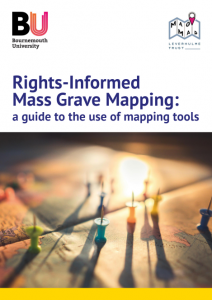
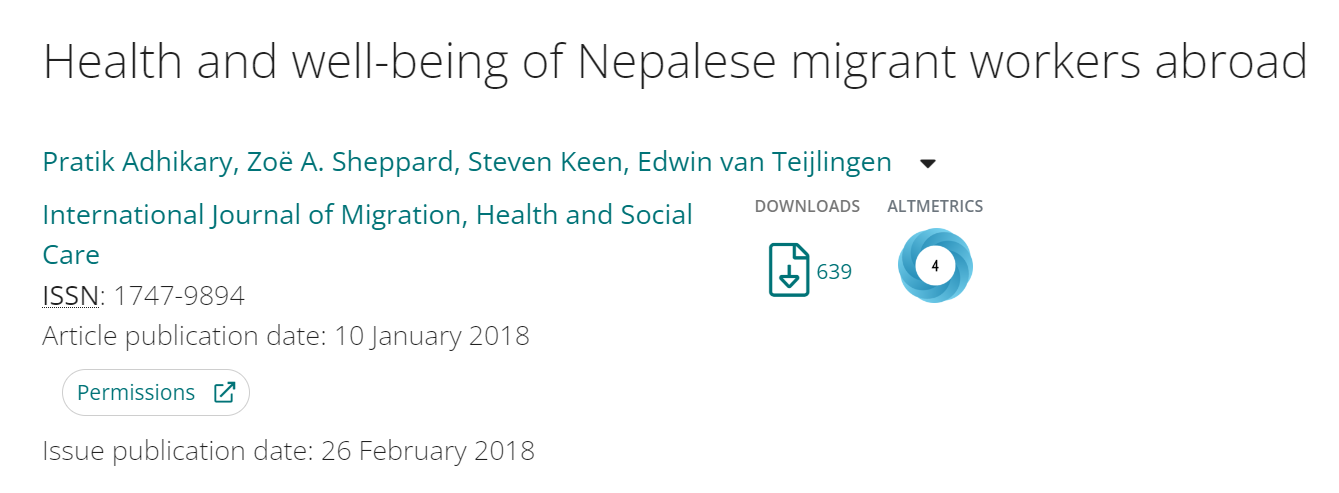 The paper ‘Health and well-being of Nepalese migrant workers abroad’ [1], which was part of the PhD work of Dr. Pratik Adhikary has been cited forty times. This is one of the many recent Bournemouth University papers focusing on the health and well-being of migrant workers from Nepal. The purpose of this paper was to assess the health and mental well-being of Nepalese construction and factory workers employed in Malaysia, Qatar and Saudi Arabia. We used a structured questionnaire administered, in and around Nepal’s international airport. In total 403 migrants who had worked for over six months in their host countries. Logistic regression was used to investigate factors associated with self-reported health status and mental health symptoms.
The paper ‘Health and well-being of Nepalese migrant workers abroad’ [1], which was part of the PhD work of Dr. Pratik Adhikary has been cited forty times. This is one of the many recent Bournemouth University papers focusing on the health and well-being of migrant workers from Nepal. The purpose of this paper was to assess the health and mental well-being of Nepalese construction and factory workers employed in Malaysia, Qatar and Saudi Arabia. We used a structured questionnaire administered, in and around Nepal’s international airport. In total 403 migrants who had worked for over six months in their host countries. Logistic regression was used to investigate factors associated with self-reported health status and mental health symptoms.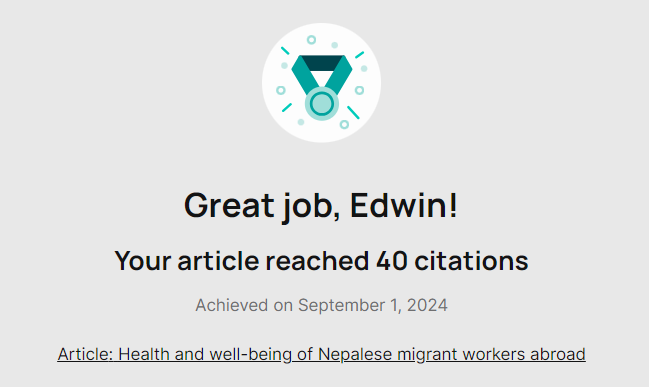
Pratik’s PhD was supervised by Dr. Zoe Sheppard, Dr. Steve Keen and Prof. Edwin van Teijlingen. This research has been financially supported by a PhD studentship at Bournemouth University and funding from the Open Society Foundation (OSF). BU supported Pratik to travel to Nepal, and the OSF provided subsistence funds. Pratik has written several further papers based on his PhD study [2-5].
References:
Congratulations to Dr. Pramod Regmi on the publication of his latest Open Access paper ‘Assessment of Health-Related Quality of Life of Stroke Survivors in Southeast Communities in Nigeria’ [1]. Dr. Regmi is based in the Centre for for Wellbeing & Long-Term Health. The paper’s co-authors include Dr. Folashade Alloh, who completed her PhD studies at Bournemouth University a few years ago.
Prof. Edwin van Teijlingen
Reference:
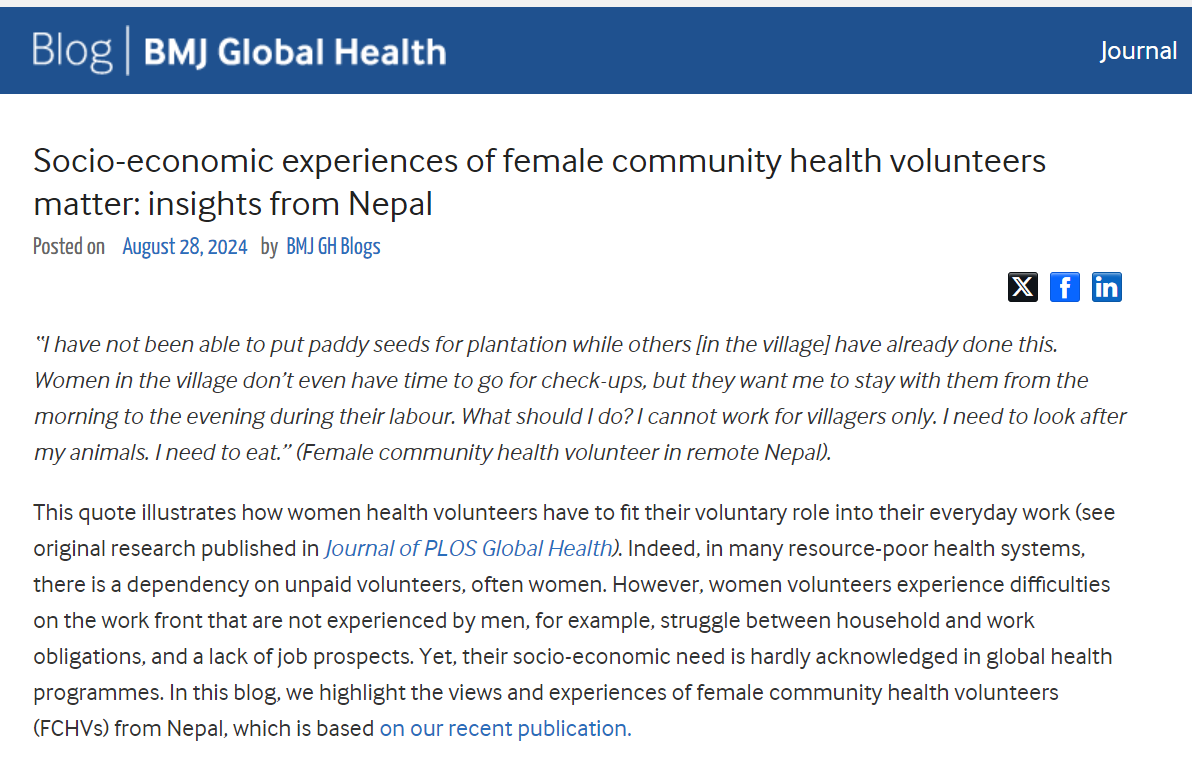 Today BMJ Global Health posted a blog (read it here!) about our recently publish paper ‘Socio-economic experiences of female community health volunteers matter: insights from Nepal’ which appeared last month in the Open Access journal PLOS Global Public Health [1]. In Nepal, about 50,000 Female Community Health Volunteers (FCHVs) are a vital human resource for both government and non-government agencies delivering primary healthcare at community level. Their contribution to maternal and child health is recognised globally. Being an active volunteer brought some interesting issues for the FCHCs. For example, the social experience of working in one’s own village was not the same for all. While community recognition of volunteers’ work was seen as a motivator, most volunteers thought they were not given due respect by fellow community members. Too often community members mistook volunteers as paid health workers often due to their involvement in medicine distribution, a rare bi-annual activity.
Today BMJ Global Health posted a blog (read it here!) about our recently publish paper ‘Socio-economic experiences of female community health volunteers matter: insights from Nepal’ which appeared last month in the Open Access journal PLOS Global Public Health [1]. In Nepal, about 50,000 Female Community Health Volunteers (FCHVs) are a vital human resource for both government and non-government agencies delivering primary healthcare at community level. Their contribution to maternal and child health is recognised globally. Being an active volunteer brought some interesting issues for the FCHCs. For example, the social experience of working in one’s own village was not the same for all. While community recognition of volunteers’ work was seen as a motivator, most volunteers thought they were not given due respect by fellow community members. Too often community members mistook volunteers as paid health workers often due to their involvement in medicine distribution, a rare bi-annual activity. 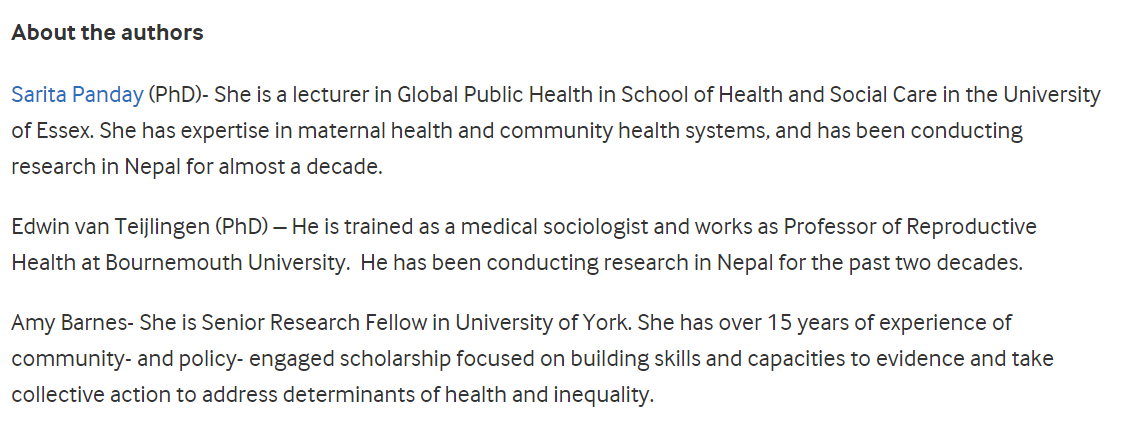
Our recent paper in BMJ Global Health was highlighted in an earlier BU Research Blog (to read this click here!). This latest paper is the third one based on Dr. Sarita Panday’s PhD research conducted at the University of Sheffield [2-3]. It is the fourth Bournemouth University paper on FCHVs with last weeks publication in the Journal of Manmohan memorial Institute of Health Sciences [4]
Professor Edwin van Teijlingen

References:
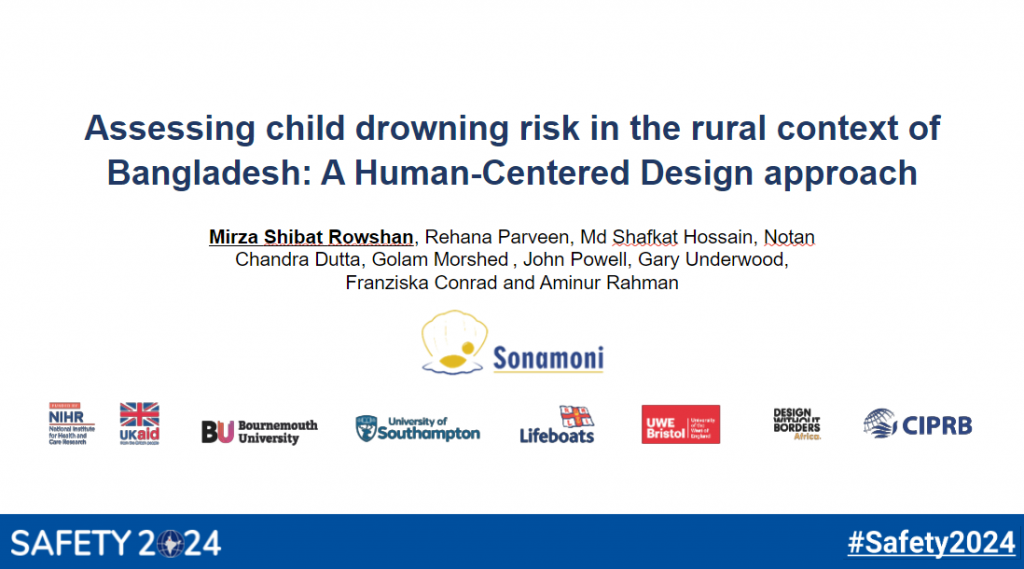 As part of the interdisciplinary Sonamoni project our collaborator Mirza Shibat Rowshan will be presenting at Safety 2024. The 15th World Conference on Injury Prevention and Safety Promotion (Safety 2024) will be held between in the first week of September in New Delhi, India. The conference is hosted by The George Institute for Global Health and co-sponsored by the World Health Organization (WHO).
As part of the interdisciplinary Sonamoni project our collaborator Mirza Shibat Rowshan will be presenting at Safety 2024. The 15th World Conference on Injury Prevention and Safety Promotion (Safety 2024) will be held between in the first week of September in New Delhi, India. The conference is hosted by The George Institute for Global Health and co-sponsored by the World Health Organization (WHO).
 Sonamoni is being coordinated by Bournemouth University and CIPRB (The Centre for Injury Prevention and Research, Bangladesh) in collaboration with the University of the West of England, Bristol, the University of Southampton, the Royal National Lifeboat Institution (RNLI), and Design Withour Borders in Uganada. This project, with Prof. Dr. Aminur Rahman as Bangladesh lead, includes a BU-based PhD project Mr. Md. Shafkat Hossain. The interdisciplinary team at Bournemouth University covers three faculties through: Dr. Mavis Bengtsson, Dr. Kyungjoo Cha, Dr. Mehdi Chowdhury, Dr. Yong Hun Lim, Mr. John Powell, and Prof. Edwin van Teijlingen.
Sonamoni is being coordinated by Bournemouth University and CIPRB (The Centre for Injury Prevention and Research, Bangladesh) in collaboration with the University of the West of England, Bristol, the University of Southampton, the Royal National Lifeboat Institution (RNLI), and Design Withour Borders in Uganada. This project, with Prof. Dr. Aminur Rahman as Bangladesh lead, includes a BU-based PhD project Mr. Md. Shafkat Hossain. The interdisciplinary team at Bournemouth University covers three faculties through: Dr. Mavis Bengtsson, Dr. Kyungjoo Cha, Dr. Mehdi Chowdhury, Dr. Yong Hun Lim, Mr. John Powell, and Prof. Edwin van Teijlingen.
Shibat works at CIPRB, which is a world leading injury prevention organisation based in Bangladesh. This presentation focuses on a needs assessment of the risk of very young children drowning in rural Bangladesh.All conference abstracts will be published in a pre-conference supplement of the scientific journal BMJ- Injury Prevention.
Prof. Edwin van Teijlingen
 Am I getting grumpier or are academic getting lazier? Or both? This morning I had to write an email in my role as one of the editors of The Journal of Asian Midwives to a group of authors somewhere in South Asia with the following text:
Am I getting grumpier or are academic getting lazier? Or both? This morning I had to write an email in my role as one of the editors of The Journal of Asian Midwives to a group of authors somewhere in South Asia with the following text:
